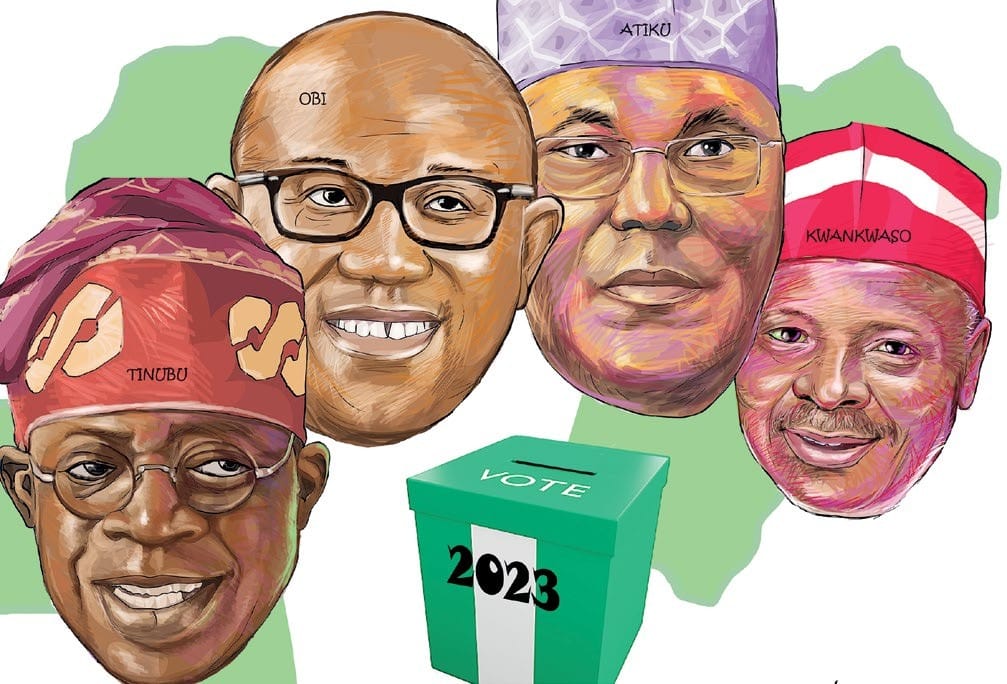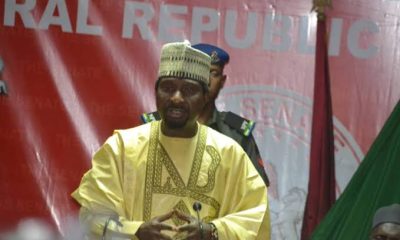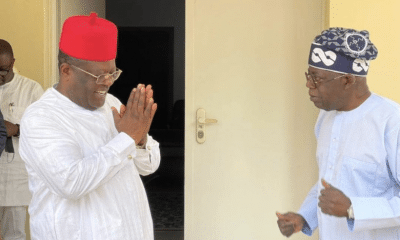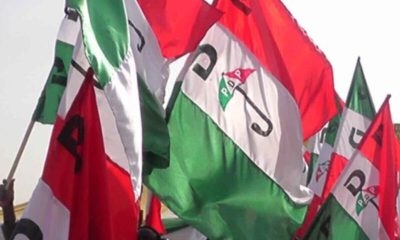Nigeria News
2023 Election: Ethnic, Religious Sentiments In Nigerian Politics

The use of language to refer to others in a derogative manner or exclude them is termed ethnic sentiment, according to African Journals online.
However, there is no doubt that the 2023 Presidential, National Assembly, and Governorship elections in Nigeria were characterized by ethnic and religious sentiments rather than competence and capacity.
A nation like Nigeria, which is well endowed with both human and mineral resources, is largely divided along party, ethnic and religious lines during any election period. Before the election, Nigerians see each other as brothers and sisters and also live together happily. Even support the same or different clubs and watch football together at various viewing centers without any sentiments.
On any other day, Nigerians are caring, and loving people, and have no issues with each other regarding ethnicity and religion until politicians sow the seed of discord among the citizens. But at any given opportunity such as during the election campaign season, politicians exploited these two factors, whipping up sentiments and thereby creating disaffection and ill-feeling.
Instead of issue-based campaigns which define politicking in civilized societies, the political candidates over here, while talking to the electorates, jumped on religion and ethnicity sentiments. Rather than debate development ideas, they revert to tribal identities as foundations for the political competition which led to a ‘war’ about where is the candidate from and their religious belief.
Tribal, Religious Interests
During the campaign last year, some leaders and supporters of the ruling All Progressive Congress (APC) and main opposition Peoples Democratic Party (PDP) pursued their tribal interests rather than issue-based campaigns.
For instance, the PDP presidential candidate, Atiku Abubakar, stirred a controversy when he said Northerners need to vote for him rather than a Yoruba or Igbo candidate because he was a Pan-Nigerian with a northern extraction that had built bridges across the country.
Also, the APC presidential candidate, Bola Ahmed Tinubu, made a controversial statement when he asked Yorubas not to vote for Atiku, and Peter Obi of the Labour Party (LP) since these are not their kinsmen.
Obi was also not left out of the religious sentiments when he visited several churches across the country and asked them to vote for him to be the next president. He was also accused of pushing a religious agenda when an alleged telephone conversation he had with the founder of the Living Faith Ministries, Bishop David Oyedepo.
Ethnic Profiling In Lagos
As we have seen in Lagos and elsewhere, ethnic and religious zealots have a way of turning political and election campaigns into life-and-death struggles. They issue threats of violence and at times actually attack supporters of rival candidates with a view to intimidating and stopping them from casting their votes. It ought not to come as any surprise that voter apathy and absenteeism were unusually high in many areas – as well as why voter turnout was very low across the country.
In Lagos where the problem created by ethnic and religious politics has continued to fester, acrimony and bad blood between Yorubas and Igbos have become a matter of concern to the security agencies. In the wake of the Lagos governorship election, Yoruba and Igbo people freely profile one another and accuse each other of criminal conduct.
Amidst the ethnic tension in the state, the Chairman of the Lagos State Parks Management Committee Chairman, Musiliu Akinsanya, also known as MC Oluomo, issued a threat to Igbo people to stay at home during the governorship election if they do not want to vote for Governor Babajide Sanwo-Olu and other APC candidates.
Though MC Oluomo later tried to recant his statement, his threat was seen coming to pass on the day of the governorship and State Assembly elections when thugs allegedly supporting the APC stormed the streets of Lagos threatening Igbos who intend to vote for opposition parties to stay at home.
The most brazen tribalistic comment of all was the one made by the Spokesman of the APC Presidential Campaign Council, Bayo Onanuga, who warned the Igbos against interfering in Lagos Politics. Criticized for his controversial and divisive ethnocentric statement, Onanuga in another statement said he does not owe anyone any apology for addressing the existential threats of the Yoruba people.
Major Consequences of Ethnoreligious Sentiments
The outcome of the presidential election showed that most people voted for their tribe person and not competence. Tinubu won majorly in the South West states including Osun, Ekiti, Ondo, Oyo, and Ogun, while Atiku won major Northern states including Katsina, Kebbi, Sokoto, Kaduna, Gombe, Yobe, Bauchi, Adamawa, and Taraba.
Obi won in Lagos largely dominated by Igbo people and all the South East and some South-South states including Edo, Cross River, Delta, Imo, Ebonyi, Anambra, Abia, and Enugu while Rabiu Kwankwaso of the New Nigeria Peoples Party (NNPP ) won in Kano State.
Speaking with Naija News, Emeka Obasi, media aide to the presidential candidate of the Labour Party (LP), Peter Obi, said ethnoreligious sentiments can be described as one of the biggest problems in the country.
He said ethnic and religious politics has always overshadowed politics based on real issues that will affect the country’s growth and development positively.
Obasi also accused the political class of dividing the citizens along ethnic and religious lines because of their selfish interests and hidden motives.
He said: “Ethnoreligious sentiment is one of the biggest problems in this country. Ethnic and religious politics has always overshadowed politics based on real issues that affect the country’s growth and development positively. You find that this is a gimmick by the elite and political holders are the people who are dividing the innocent Nigerians by saying that a Hausa man hates an Igbo and an Igbo man hates the Yoruba man, and vice versa, and other tribes are camped into minority groups to even divide the harmony that should have been in the country blessed enough to be one of the greatest in the world.
“Politicians who come into government through ethnoreligious sentiments use their power for corruption, enriching themselves, and fail to fulfill their campaign promises. It is very easy for politicians to cling to power as a result of the ethnic and religious divide so that they will continue to strife the nation.
“When Peter Obi joined the race, his idea has been completely different. He allows said whenever he mounts any podium that the citizens should not vote for him because he is a Christain, an Igbo man but they should vote for him based on his competence and capacity to take Nigeria to the next level the world expects it to be.
“Unfortunately, the ruling All Progressives Congress (APC) saw the danger Obi’s message portends for their presidential candidate who will cling to power and see the country go down the drain. The ruling party saw that Nigerians are receiving the Obi message and decided to bring a Muslim-Muslim ticket, and immediately that happened, they brought religious sentiment into the campaign and later brought in ethnic rhetorics in the polity.”
Also speaking with our correspondent, a member of the All Progressives Congress (APC), Yusuf Oladimeji, said some of the major consequences of ethnoreligious sentiments are dire and have a reaching effect on politics and governance.
Oladimeji, however, asked Nigerians to shun ethnic and religious sentiments and all forms of bias that may affect the peace and unity of the country.
He said: “The country will continue to go down in every aspect of governance and development when the politician campaign based on ethnicity. When a politician gets power through ethnic and religious sentiment, such a person will appoint based on ethnicity and religion. It means all appointments will be lopsided.
Ethno-religious sentiments also play a key role in determining the dynamism of governance and the outcome of elections in Nigeria. Over the years, it has been used as a tool by the leaders in Nigeria to control and oppress the people.
“Other major consequences of ethnoreligious sentiments are ethno-Religious conflicts, ethnic agitations for access to national resources, National Cake Syndrome, and lopsided appointments based on ethnicity.“












